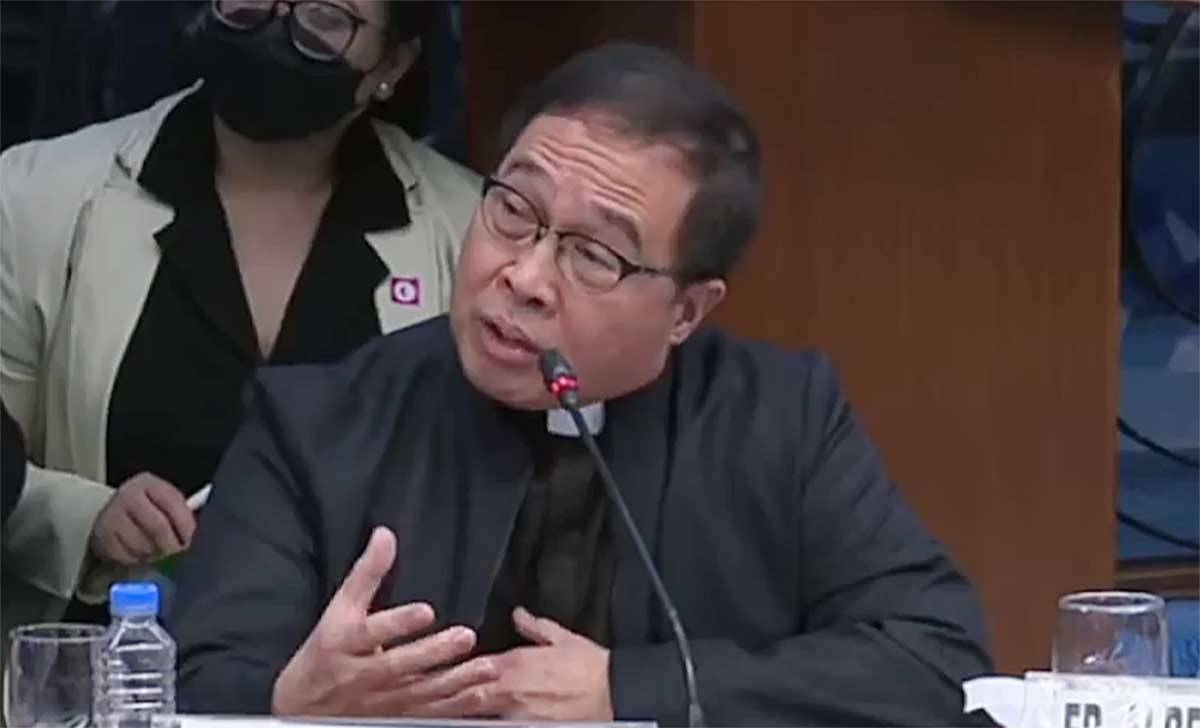
THE Coordinating Council of Private Educational Associations of the Philippines (Cocopea) warned that allowing foreigners to control higher learning institutions in the country threatens Filipino culture and values.
Sen. Juan Edgardo "Sonny" Angara, chairman of the Subcommittee on Senate Resolution of Both Houses (RBH) 6, resumed on Tuesday discussions on the proposal to open several sectors, including education, to foreign ownership by relaxing constitutional restrictions.
Cocopea President Fr. Albert Delvo. Screengrab from Senate Public Hearing of the Committee on Constitutional Amendments and Revision of Codes"We respectfully urge the lawmakers to proceed with caution regarding introducing amendments to the pertinent provisions because this will have an outstanding repercussions, implications for the Filipino generations to come," Cocopea President Fr. Albert Delvo said during the hearing.
Dr. Karol Mark Yee, EdCom 2 executive director, said that based on their analysis, the "Philippines is one of the strictest countries in terms of foreign ownership in Asean (Association of Southeast Asian Nations)."
Yee said Asean member countries Singapore, Malaysia, Vietnam, Myanmar, Laos and Cambodia allow foreign entities to own schools fully.
It is only in the Philippines that foreign ownership of educational institutions is "stipulated in the Constitution," he said.
Delvo said Cocopea counts as members 70 percent of the country's private basic and tertiary educational institutions.
He said Cocopea "will constructively work with our legislators so that we can contribute to the enhancement of the quality of education of the country and at the same time safeguarding the interests of the Filipino citizens and likewise the learners and students."
"We are cautious because if we allow foreign citizens to control, own and administer the institutions that we are looking at, that may be prejudicial to our Filipino culture, values, morals, spiritual matters. They may be endangered," he said.
Joshua Alexander Calaguas, Philippine Association of Colleges and Universities counsel, shared Cocopea's concerns.
PACU is "one with Cocopea [in calling] for lawmakers to exercise prudence and foresight in their deliberations with regard to this matter," Calaguas said.
He said some of the proposed amendments "may run counter with other provisions in the Constitution. We just wanted to point that out that the Constitution emphasizes fostering patriotism and nationalism."
Former Commission on Higher Education (CHEd) chairman Patricia Licuanan was explicit in opposing RBH 6. "No to foreign ownership of schools," Licuanan said.
"In other words, 'No to Charter change.' Let us stop this wasteful and divisive activity and focus on things that really matter before it is too late," she said.
Angara said RBH 6 should not be interpreted "to mean that Congress would also be able to amend basic education."
"I think that's not the intention of the Senate President [Juan Miguel Zubiri], Senator [Lorna Regina] Legarda, and myself in filing Resolution Number 6 on the education provision. The intention is to keep basic education in the hands of Filipinos," he said.
"It's important to state that before we actually seek to amend the constitutional provision on ownership or management and control of higher education institutions, perhaps we should aim at greater precision in the language of the amendments," he said.
Article 14, Section 4 (2) of the Constitution states that "educational institutions, other than those established by religious groups and mission boards, shall be owned solely by citizens of the Philippines or corporations or associations at least sixty per centum of the capital of which is owned by such citizens."
Angara raised the importance of keeping an open mind and fostering constructive dialogue on the proposed amendments to the economic provisions.
"This is the first time since 1987 that we've been discussing the economic amendments in earnest or in detail. It took us this long because the Charter debate was poisoned by political and personal ambition. That's the reality," he said in response to Licuanan's questioning.
Licuanan emphasized the crucial role of partnerships and technology transfer in driving innovation in education.
"Nowhere does it prove to me that ownership is necessary. I agree with all of these wonderful innovations, but do we have to bring, do we have to own it?" she said.
Angara suggested that the current approach to the issue of charter amendments be reconsidered. "Maybe it's better just in legislation, and then we leave it as is for now," he said.
"Let's just plow through and talk about the merits and what needs to be done. Let's put away all the noise and try to make some sense about all this," he said.
Read The Rest at :



